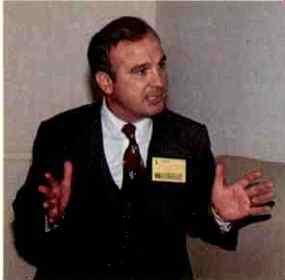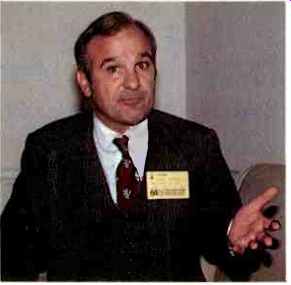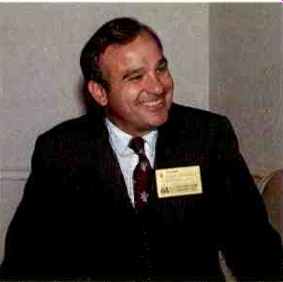One of a series of interviews with the audio industry's innovators and thinkers. [ca. Feb. 1980]



Dr. Thomas Stockham is uniquely qualified to comment on the future of high fidelity. In 1968, as a professor at the Univ. of Utah, he developed one of the first digital recorders capable of high-quality music reproduction. The company he founded and now heads, Soundstream, Inc., of Salt Lake City, Utah, specializes in digital recordings produced using equipment designed by him and his company. Among the 50 records produced via the Soundstream system are a widely acclaimed RCA series of Caruso transcriptions, restored using digital sound processing, and the master tape of Fleetwood Mac's recent Tusk album.
The company is among the best-known recording firms in the world.
Stockham talked with Audio at the recent Audio Engineering Society Convention in New York, in the Waldorf Astoria's Cole Porter Suite (graciously made available by the Society). There the conversation ranged over a broad spectrum of topics, from the sound system for Disney's classic "Fantasia" to some suggestions to help recording engineers maintain musical objectivity. Excerpted here are Dr. Stockham's thoughts on high fidelity's direction in the coming decades.
Audio: As you view the future of audio, how do you see the musical storage media-disc, tape, credit card style plate, whatever-shaping up over the next 10 or 15 years?
Stockham: First, I do not see video cassettes adapted to digital being a substantive and permanent addition.
The main problem is the problem of copying. High-speed duplication of digital is even more difficult than duplication of analog, because the bandwidth of the basic digital information-not the sound but the codes-is much greater than in analog.
The bandwidth of a basic audio code at normal speeds is equal to the bandwidth of a high-speed analog duplication. Some fundamental breakthroughs in tape copying could change this, but in spite of promises over the years, there has not yet been anything demonstrated that is really practical. So, I see the adapted video cassette as a kind of bridge, and perhaps it could hang on as a home recording vehicle.
Relative to a disc format, I find it curious and at the same time natural that video discs should be adapted to digital-audio applications. Technically, it is an obvious direction to go in, and there are as you know, two fundamental approaches. One is to take the video disc player and create audio discs and a digital adaptor of some sort, perhaps built-in. This will allow you to play television programs and digital audio on the same machine. And then there is the alternative approach, which for example the Philips Compact Disc has taken (See "Audio ETC.," Audio, Sept., '79), to use video technology but reshape it completely for audio only.
Perhaps both of these approaches have a place. I personally prefer the audio only direction, because one of the things we have learned in the last decade or two about new storage media is that the shape and size and feel can be as important as the technical characteristics. Why, for example, should the Philips Compact Cassette have been of any usefulness or had any success in the record business? For the most part the technical quality of a cassette is somewhat poorer than that of a disc.' Well, it's compact, easy to carry around, one can quickly take it out of the player, and so on. In short, it has appealing physical characteristics above and beyond the sound characteristics.
Audio: You then think that smaller is the route we may take?
Stockham: I think that we may see a smaller digital record, of higher quality than today's records, with nominally the same amount of program material, or even more. But who is to say that we won't have a multiplicity of digital audio media? We have at least three analog media that are commercially viable right now, and V would think that one would expect more than one medium in digital, certainly not right away but after a while.
Audio: Have you at Soundstream done any work relative to digital disc development?
Stockham: Soundstream has done no explicit product development as far as a digital disc is concerned. However, we are extremely interested in this and active in the area.
Audio: How fully is digital audio developed at this point, in your view?
Stockham: Well, nothing is ever fully developed. If you mean by fully developed that digital recording is capable of doing something interesting for the consumer, then I would say "yes." We have produced with our customers, to date, 50 long-playing records, all hybrids--analog records with digital mastering and recording. Nippon Columbia has produced twice that or more. 3M has done some; Sony has done some. Digital is taking its place in the entertainment industry, so it is in that sense developed.
Audio: Do you think that there is likely to be any significant audible improvement as time goes on, or do you think the present specifications place digital audio systems essentially beyond the discrimination of the human ear? Are there any audible differences between the various available digital recording systems, for instance?
Stockham: I have not heard them all together, so I couldn't tell you. I believe, however, that the properly designed digital systems available today are developed enough, from the point of view of audio fidelity, that the differences between them are comparable to the differences between high-quality amplifiers of different brands.
Audio: Extremely subtle, then.
Stockham: Well, subtle, let's say, or at least rather small. That does not mean, of course, that all of the available systems have been properly designed. I've heard some that sound very good, some that don't sound very good at all. I do not imagine that the sound of a digital system would be an area in which one would expect a big stride forward from the best we have now.
Audio: And yet there has been some resistance to digital on the part of some engineers and reviewers, who claim it sounds artificial in some way. How do you feel about that?
Stockham: The best information I have is that a properly designed digital audio system should not sound and does not sound, in my experience, any different from a direct connection to the source or a very, very high-quality amplifier. Within the scope of the experiences that I've had, I cannot detect any differences between the direct and the digitized material.
Audio: Then you're inclined to think that these remarks are "politically" motivated?
Stockham: I don't know what basis they have. I suspect a bit of skepticism, a bit of nervousness, a bit of "digital isn't good for my business" motivation. Whether that is really true or not, some people may reach that conclusion.
Audio: Where you stand depends on where you sit.
Stockham: That's right. I have no truly objective evidence that any of the comments are true, and I've never had anyone offer to show how I or anyone else can hear the difference. I know that objective, measurable differences exist; you put a signal through any device and what comes out will be different in some way from the signal that goes in. The question is whether or not these are audible, either on an absolute scale or in a way that anybody, even a finicky person, really cares about. I've concluded that the differences between direct and digital are either subjectively null or very, very trivial. Even if we say that there are some differences, which I claim there aren't, I'm absolutely certain that with digital you get a big bushelful of benefits, and whatever you give up is mighty small.
Audio: How do you, as someone who has contributed to the state-of-the-art technology, envision the home music system changing during the next couple of decades? What sort of sequence do you see?
Stockham: I see the next major change being probably in the area of the digital audio disc we have discussed. You will be able to go to the store and buy a piece of plastic with digits on it, and a player to play it on. It will be connected to your present hi-fi system much like a cassette deck. And you will be able to play these records. It won't mean that you cannot play analog cassettes also or the analog records you have. It will be simply another input source.
But I envision another funny phenomenon happening when this disc player becomes available. I don't think people understand yet just how good these digital discs really are. For those who are really into listening and into hi-fi, as your magazine's readers are, the experience of hearing a digital master-tape-quality record is going to be the wave of the future. Just as an example, I was playing a high-quality direct-to-disc record in my home one evening, and I had some guests in 10 or 20 couples. We had recorded the same piece of music at the same time on digital tape, and I had set up the digital recorder in the back room.
When I started the disc, I pushed the start button on the digital tape recorder, so they would be in synchronization, then came out and let the disc play for awhile. During a quiet passage I just switched over without anybody noticing, in a place where the music did not change character in any way. Conversations were going on, and a few true-blue audiophiles were listening at the front of the room. When the digital music came up, fully 70 percent of the people in the room just fell silent.
Audio: Dumbstruck, as it were.
Stockham: Something happened. There was an involvement, a force of presence, something, that just enveloped them. And I've seen this again and again in playing our digital tapes. The involvement level goes way up; people are no longer exposing themselves to the music. They are becoming involved in it.
Audio: And you believe the advent of digital audio will involve a larger number of people more deeply?
Stockham: Right. Involve a much larger number of people who will feel that listening to recorded music is a more involving experience.
Audio: After the digital discs become available, what then?
Stockham: The major technological advances that still have to be made have to do with recording techniques, including microphone development and mike placement techniques, and with loudspeaker development, the whole transducer field. Attention is going to be returned to the sound radiation problem, new solutions to the questions of how you take the recorded sound and display it in the air. That will involve the loudspeakers themselves, and also the loudspeaker placement. It will involve a certain amount of signal and ambience processing. And, while I'm not advocating that multiplicities of channels should be aggressively sought by people, I think that it is an area that will receive a lot of attention.
There are substantive improvements to be made here. We have made some progress on the problem of how to launch sound into the air, but we remain as far from being where we want to be as the mid-'50s mono record was from today's audiophile discs.
(adapted from Audio magazine, Feb. 1980)
Also see:
Digital Recording: State of the Market (Dec. 1979)
Digital Techniques in Sound Reproduction-- Part I (April 1980)
Telefunken Digital Mini Disc (June 1981)
= = = =